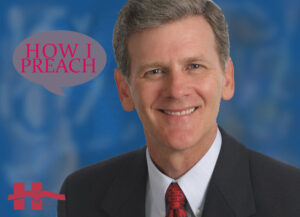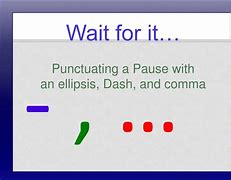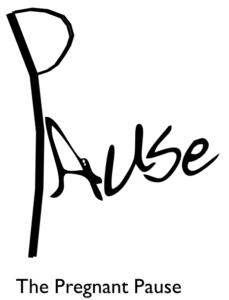The Power of the Pregnant Pause
The Power Of The Pregnant Pause
I learned the power of the pregnant pause by accident. It happened when I was a seminary student, assigned to  preach in a pretty conservative church near our school. I was nervous, because at that time I had long hair and a full beard, and I feared that I would be rejected for how I looked. To complicate my nervousness, I misread the time of the service. So instead of arriving early, as was my practice, I arrived just as the service was starting. I walked up on stage to lead the service, which was also part of my responsibility for the day. I settled down some by the time the sermon came, and felt I was ready to go.
preach in a pretty conservative church near our school. I was nervous, because at that time I had long hair and a full beard, and I feared that I would be rejected for how I looked. To complicate my nervousness, I misread the time of the service. So instead of arriving early, as was my practice, I arrived just as the service was starting. I walked up on stage to lead the service, which was also part of my responsibility for the day. I settled down some by the time the sermon came, and felt I was ready to go.
In seminary I experimented with various systems of preaching. At the time of this story, I used an outline. I remember the sermon yet today. It was about the second coming of Jesus, and I began with the planned story about the Millerites, a group who predicted when Jesus was coming back. But somewhere in the middle of the sermon, I forgot what my next point was. I quickly scanned my notes for some hint. I wracked my brain, but nothing came. So, I just stood there, silent, as I tried to figure out what I was supposed to say next. The congregation became deathly still. I think they were waiting to see if I was going to faint.
I learned several things that day. First, I learned that I had to prepare more. Secondly, I learned that a pause can be powerful in getting and holding the attention of your listeners.
The Pause Has Attention Power
Most of us don’t like silence–especially when we are preaching. Too often, preachers will fill the silence with expressions like “uh…” or “um…”. We have been thinking about the use of the voice in the last few posts. The theme today is that the power of the pregnant pause is something you should have in your toolkit as you prepare and present your sermon.

Bryan Chapell
I have quoted Bryan Chapell often. He has taught and written about preaching. Here’s what he says about the power of a pause:
The best speakers not only vary their expressing from thundering to whispering and their pace from crawling to racing, but also let their most telling statements echo in pauses that emphasize thought. (Christ-Centered Preaching, p. 333)
The Pause As Punctuation
Maybe the best way to think about the power of the pregnant pause is to  consider it as punctuation. When you read, punctuation provides the structure that allows you to understand the words. However, when words are just strung together, they become a jumble that provides little understanding of their importance. As you preach silence can serve as punctuation. It sets a thought apart.
consider it as punctuation. When you read, punctuation provides the structure that allows you to understand the words. However, when words are just strung together, they become a jumble that provides little understanding of their importance. As you preach silence can serve as punctuation. It sets a thought apart.
So, think of the pause in one of these ways:
- a comma, or a brief pause in your expression of a thought
- a period, or a full stop in a thought
- an ellipse, which is a long break in the thought. An ellipse is usually used in story telling to create suspense about what is to come next.
When you are preparing your sermon, think about which points need a special emphasis. These are the things you want your audience to remember. When you practice your sermon, put in a pause before or after the main ideas. Let those ideas settle in with people.
An Example of the Power of the Pregnant Pause
 One time that I think I used a pause well was preaching about grace. I shared the story of a group of people representing various religions coming together to discuss commonalities and differences. In one breakout group, the discussion centered on what was unique about Christianity among the world’s religions. Virgin birth? That’s not totally unique, as some other religions claim this for their founder. Resurrection? Some other religions claim that, too. So, what’s unique about our faith? The discussion ranged for awhile, and then C.S. Lewis, the great theologian/writer came into the room. Someone recognized him, and threw the question to him. What’s unique about Christianity? He quickly replied, “That’s easy. It’s…. and I paused for a long moment. It was a great moment to ask the audience–after the pause– “What do you think he said?” I gave the answer: Grace. Grace is what makes us unique among the religions of the world.
One time that I think I used a pause well was preaching about grace. I shared the story of a group of people representing various religions coming together to discuss commonalities and differences. In one breakout group, the discussion centered on what was unique about Christianity among the world’s religions. Virgin birth? That’s not totally unique, as some other religions claim this for their founder. Resurrection? Some other religions claim that, too. So, what’s unique about our faith? The discussion ranged for awhile, and then C.S. Lewis, the great theologian/writer came into the room. Someone recognized him, and threw the question to him. What’s unique about Christianity? He quickly replied, “That’s easy. It’s…. and I paused for a long moment. It was a great moment to ask the audience–after the pause– “What do you think he said?” I gave the answer: Grace. Grace is what makes us unique among the religions of the world.
Use your pauses well, and they will add power to your preaching. Here is a speech trainer reflecting on this technique with some good suggestions.



